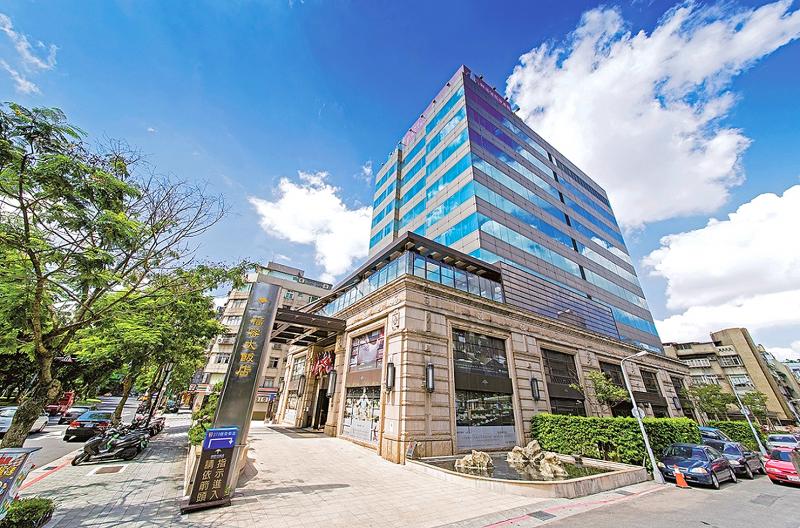Developer Lih Pao Group (麗寶集團) is moving ahead with the construction of a mixed-use complex near Yuanshan MRT Station in Taipei, after it on Monday last week announced it would close an unprofitable hotel on Taipei’s Jianguo S Road on Sept. 1.
The group, which operates 13 hotels under the Fullon Hotels and Resorts (福容大飯店) brand, said it plans to spend NT$4.3 billion (US$154.1 million) building the complex, which is a joint venture with the National Housing and Urban Regeneration Center (國家住宅及都市更新中心).
The complex is to feature two buildings, one with 10 floors and the other with 11, containing residential, retail and recreational spaces, as well as a new Fullon hotel, the developer said.

Photo courtesy of Fullon Hotel Taipei
The decision to build a new hotel comes amid a difficult operating environment due to the COVID-19 pandemic. Occupancy for tourist hotels in Taipei has fallen below 10 percent this month, after the government last month urged people to stay at home and banned dine-in services amid a level 3 COVID-19 alert.
The outgoing Fullon Hotel Taipei (福容大飯店台北一館) had an average occupancy rate of 14.57 percent in the first five months of this year, with daily room rates at NT$3,187, company data showed.
The occupancy rate slipped to 12.9 percent this month, said the hotel, which opened 15 years ago.
The Fullon Hotel Taipei employees can choose to work at other properties or subsidiaries, while customers with restaurant and hotel vouchers are eligible for refunds or can redeem them at other locations, Lih Pao said.
The group also owns theme parks in Taichung and hotels in New Taipei City, Taoyuan, Taichung, Kaohsiung, Pingtung City and Hualien City.

With an approval rating of just two percent, Peruvian President Dina Boluarte might be the world’s most unpopular leader, according to pollsters. Protests greeted her rise to power 29 months ago, and have marked her entire term — joined by assorted scandals, investigations, controversies and a surge in gang violence. The 63-year-old is the target of a dozen probes, including for her alleged failure to declare gifts of luxury jewels and watches, a scandal inevitably dubbed “Rolexgate.” She is also under the microscope for a two-week undeclared absence for nose surgery — which she insists was medical, not cosmetic — and is

GROWING CONCERN: Some senior Trump administration officials opposed the UAE expansion over fears that another TSMC project could jeopardize its US investment Taiwan Semiconductor Manufacturing Co (TSMC, 台積電) is evaluating building an advanced production facility in the United Arab Emirates (UAE) and has discussed the possibility with officials in US President Donald Trump’s administration, people familiar with the matter said, in a potentially major bet on the Middle East that would only come to fruition with Washington’s approval. The company has had multiple meetings in the past few months with US Special Envoy to the Middle East Steve Witkoff and officials from MGX, an influential investment vehicle overseen by the UAE president’s brother, the people said. The conversations are a continuation of talks that

CAUTIOUS RECOVERY: While the manufacturing sector returned to growth amid the US-China trade truce, firms remain wary as uncertainty clouds the outlook, the CIER said The local manufacturing sector returned to expansion last month, as the official purchasing managers’ index (PMI) rose 2.1 points to 51.0, driven by a temporary easing in US-China trade tensions, the Chung-Hua Institution for Economic Research (CIER, 中華經濟研究院) said yesterday. The PMI gauges the health of the manufacturing industry, with readings above 50 indicating expansion and those below 50 signaling contraction. “Firms are not as pessimistic as they were in April, but they remain far from optimistic,” CIER president Lien Hsien-ming (連賢明) said at a news conference. The full impact of US tariff decisions is unlikely to become clear until later this month

Nintendo Co hopes to match the runaway success of the Switch when its leveled-up new console hits shelves on Thursday, with strong early sales expected despite the gadget’s high price. Featuring a bigger screen and more processing power, the Switch 2 is an upgrade to its predecessor, which has sold 152 million units since launching in 2017 — making it the third-best-selling video game console of all time. However, despite buzz among fans and robust demand for pre-orders, headwinds for Nintendo include uncertainty over US trade tariffs and whether enough people are willing to shell out. The Switch 2 “is priced relatively high”